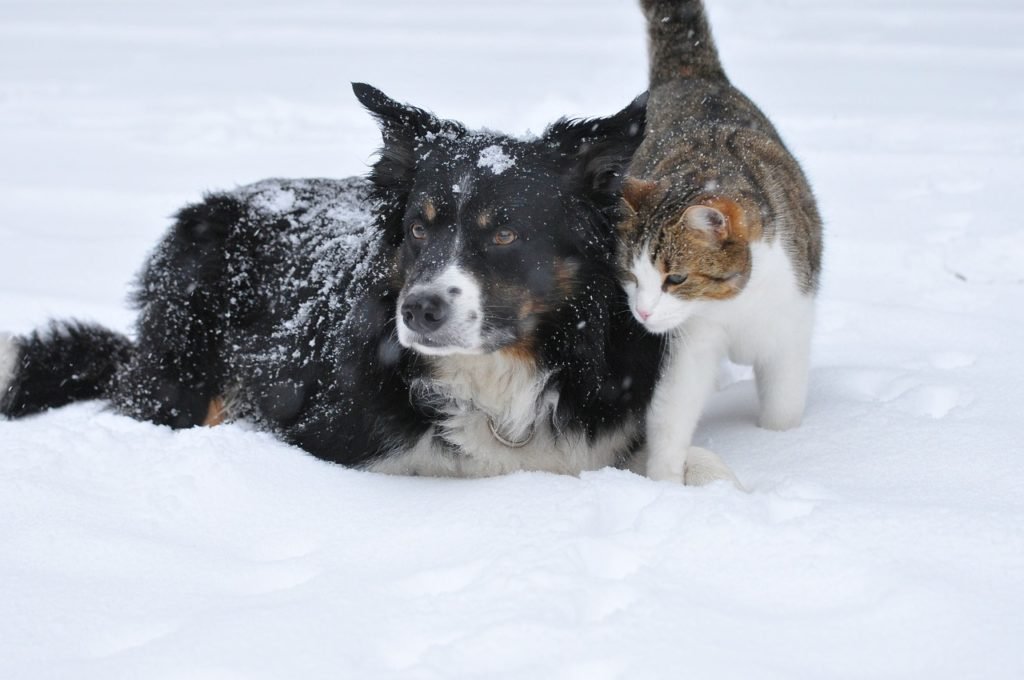Unfortunately, the winter season is not over, and we can still expect to see frigid temperatures in the weeks ahead. We want to remind you how critical it is for you to care for your pets during these times. We’ve heard too many horror stories about pets being left out in the cold. Just because your pet has a thick coat of fur does not mean they’re well-equipped to handle the frigid outdoor temperatures. Below, you’ll find a few tips to help keep your pets safe during the winter.
Don’t Leave Your Pet Outside For Too Long
Even with a thick coat, your pet can suffer from hypothermia. Bitter cold can overwhelm your pet’s system for heat retention and regulation, much like how mountain climbers can succumb to hypothermia even if they’re wearing protective clothing.
Additionally, pets may not be able to get enough air in their lungs when the temperatures drop. As Robert Rauch of the Joplin Humane Society describes, “Dogs can actually regulate their temperatures by the way they breathe and the way they pant their fur, but there’s a point where you can’t get enough air in your lungs. When it’s that cold with the wind chill factor being that bad, it becomes extra dangerous.”
Furthermore, when your pet’s coat is wet, it loses much of its ability to self-insulate. If there’s snow on the ground outside, your pet could suffer from the cold much quicker than usual. We recommend that you monitor your pet while outside. Never leave your pet out alone for more than a couple of minutes at a time. A rule of thumb? If it’s too cold for you to be outside, it’s probably too cold for your pet to be out as well.
Wipe Your Pet Down When They Come Inside
When your pet comes in from being outside, make sure to wipe them down thoroughly. Dry their coat to allow them to keep warm. More important, you’ll want to wipe your pet’s paws well. During the winter months, there is an increase of toxic chemicals on the ground from substances such as:
- Antifreeze
- Salt
- De-icers
If your pet were to come inside and lick their paws, these chemicals could make them very sick. While cleaning your pet’s paws, also check for signs of cracking or bleeding. Your pet’s paws are more likely to dry during the winter. If these chemicals enter an open wound, your pet is at risk of severe infection.
Similarly, make sure you avoid antifreeze spills in your garage. Antifreeze has a particularly sweet taste, which causes many pets to ingest it unknowingly. Unfortunately, if your pet drinks antifreeze, they could quickly become ill and potentially die. Don’t leave antifreeze spills lying around in your garage. Also, be sure that you don’t let your pets drink any foreign substances when taking them for a walk.
Be Cautious With Cars
First and foremost, you should consider leaving your pet at home when it’s cold outside. Much like how a hot car can be dangerous to a pet’s health, so too can a car that’s too cold. We know that you’ll miss your pets – and they’ll miss you as well – but you’re better off leaving them at home unless it’s necessary to have them with you.
When you go to start your car, make sure you check the tire wheels and underneath the hood. These areas provide shelters to pets and wildlife, especially cats. You don’t need to do anything more than bang on the hood of your car once or twice to scare the animals away.

